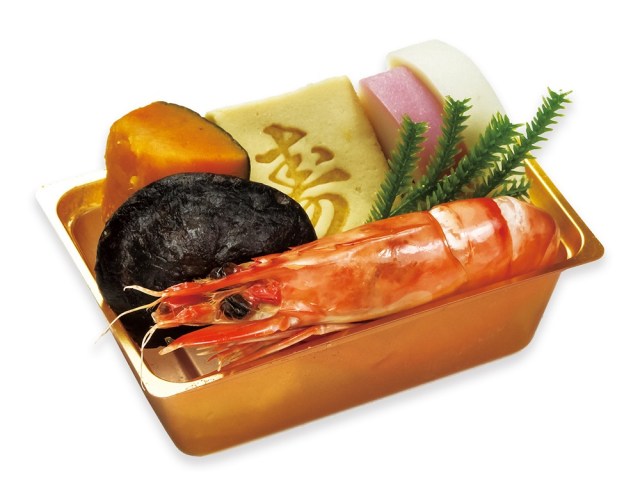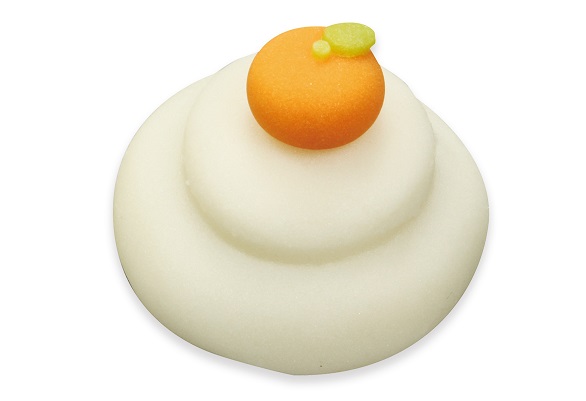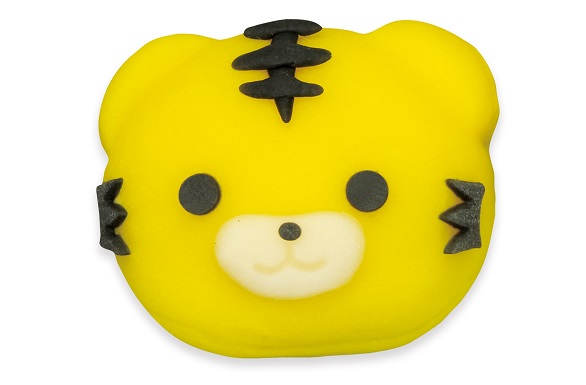
Osechi becomes Kosechi at Kura Sushi.
In Japan, part of the traditional New Year’s celebration is eating osechi, a lavish array of gourmet morsels, each with some sort of auspicious aspect to their name or appearance. Because of its gourmet nature, osechi tends to be difficult to cook yourself and expensive to buy pre-made, but classically minded foodies feel it’s worth the effort/investment to share such a special meal with your family.
But what if you don’t have plans to see your family, or anyone else, at New Year’s? Don’t worry, because conveyor belt sushi chain Kura Sushi (also known as Kurazushi) now has osechi for people who’ll be starting the new year off solo.
It’s called the Kosechi, or “Little Osechi,” set, and it’s a scaled-down osechi assortment for one. First off there’s a jumbo shrimp, which is supposed to grant you a long life, under the folk wisdom that you’ll grow old enough to one day have a back as bent as the curled-up shrimp’s. The two pieces of kamaboko fish cake are in red and white, which are considered a lucky, celebratory color combination in Japan.
The good wishes are at their most direct with the block of tofu bearing the kanji for kotobuki, or “happiness.” The remaining two pieces, stewed shiitake mushroom and kabocha (Japanese pumpkin), are less common members of the osechi cast, but in the case of shiitake, their status as a delicacy provides an atmosphere of beginning the year on a culinary high note. As for the kabocha, because the squash-like vegetable’s nutrients are said to be effective in preventing colds it’s traditionally eaten at the winter solstice, and sometimes slides its way into osechi a little over a week later. Plus the specific variety in the Kosechi set is called Ebisu kabocha, named after Ebisu, one of Japan’s Seven Gods of Fortune who bestows wealth and prosperity.
And obviously, if you’re hoping to start the new year off on the right foot, you’ll want to end your meal with dessert, and so Kura Sushi also has two special seasonal sweets. First is what appears to be kagami mochi, the stack of rice cakes topped with a mandarin orange that Japanese families set out as a New Year’s decoration. In reality, though, what Kura Sushi is offering is a confectionary made out of sweet bean paste with strawberry flavoring.
There’s also a sweet bean paste tiger, since Japan goes ahead and switches over to the next Chinese Zodiac animal in line on January 1.
The Kosechi is priced at 500 yen (US$4.35) and the desserts at 220 yen each, so eating all three shouldn’t blow your food budget for the year, and they’re all available as eat-in items at Kura Sushi branches starting December 27. And if it’s Christmas that you’re spending alone, don’t worry, Japan has a meal for that situation too.
Source: Press release
Top image ©SoraNews24
Insert images: Press release
● Want to hear about SoraNews24’s latest articles as soon as they’re published? Follow us on Facebook and Twitter!




 Celebrate New Years in Pokémon style — with a monster ball filled with traditional osechi food!
Celebrate New Years in Pokémon style — with a monster ball filled with traditional osechi food! Awesome Pokémon osechi New Year’s meals elegantly blend Japan’s traditional and pop culture
Awesome Pokémon osechi New Year’s meals elegantly blend Japan’s traditional and pop culture Six non-traditional osechi New Year’s meals in Japan
Six non-traditional osechi New Year’s meals in Japan Get a taste of the Mushroom Kingdom this New Year with a Super Mario Bros. themed bento box
Get a taste of the Mushroom Kingdom this New Year with a Super Mario Bros. themed bento box You can enjoy traditional Japanese New Year’s osechi eats on a budget with Lawson Store 100
You can enjoy traditional Japanese New Year’s osechi eats on a budget with Lawson Store 100 Japan’s new difficult-to-drink-from beer glass protects your liver, but it’s a brutal experience
Japan’s new difficult-to-drink-from beer glass protects your liver, but it’s a brutal experience How to order snacks on a Shinkansen bullet train in Japan
How to order snacks on a Shinkansen bullet train in Japan New Pokémon ice cream, dessert drinks, and cool merch coming to Baskin-Robbins Japan【Pics】
New Pokémon ice cream, dessert drinks, and cool merch coming to Baskin-Robbins Japan【Pics】 Demon Slayer: Kimetsu no Yaiba gets new roller coaster attractions and food at Universal Studios Japan
Demon Slayer: Kimetsu no Yaiba gets new roller coaster attractions and food at Universal Studios Japan Caffeinated ramen for gamers that you can eat with one hand going on sale in Japan
Caffeinated ramen for gamers that you can eat with one hand going on sale in Japan Burger King Japan suddenly adds Dr. Pepper and Dr. Pepper floats to its menu nationwide
Burger King Japan suddenly adds Dr. Pepper and Dr. Pepper floats to its menu nationwide “The most Delicious Cup Noodle in history” – Japan’s French Cup Noodle wins our heart【Taste test】
“The most Delicious Cup Noodle in history” – Japan’s French Cup Noodle wins our heart【Taste test】 New samurai glasses are Japan’s latest weird must-have souvenir
New samurai glasses are Japan’s latest weird must-have souvenir Doraemon found buried at sea as scene from 1993 anime becomes real life【Photos】
Doraemon found buried at sea as scene from 1993 anime becomes real life【Photos】 Hello, cosmetics! Clinique teams up with Hello Kitty this summer for first-time collaboration
Hello, cosmetics! Clinique teams up with Hello Kitty this summer for first-time collaboration Nintendo history you can feel – Super NES, N64, and GameCube controllers become capsule toys
Nintendo history you can feel – Super NES, N64, and GameCube controllers become capsule toys Starbucks releases a cute Frappuccino and Unicorn Cake…but not in Japan
Starbucks releases a cute Frappuccino and Unicorn Cake…but not in Japan Kyoto Tower mascot termination reveals dark side behind cute Japanese characters
Kyoto Tower mascot termination reveals dark side behind cute Japanese characters McDonald’s Japan’s Soft Twist Tower: A phantom ice cream only sold at select branches
McDonald’s Japan’s Soft Twist Tower: A phantom ice cream only sold at select branches Yabai Ramen: What makes this Japanese ramen so dangerous?
Yabai Ramen: What makes this Japanese ramen so dangerous? Finally! Nintendo Japan expands Switch 8-bit controller sales to everybody, Online member or not
Finally! Nintendo Japan expands Switch 8-bit controller sales to everybody, Online member or not Japanese government wants to build luxury resorts in all national parks for foreign tourists
Japanese government wants to build luxury resorts in all national parks for foreign tourists To combat declining birth rate, Japan to begin offering “Breeding Visas” to foreigners
To combat declining birth rate, Japan to begin offering “Breeding Visas” to foreigners 10 things you should buy at 7-Eleven in Japan
10 things you should buy at 7-Eleven in Japan Studio Ghibli releases anime heroine cosplay dresses that are super comfy to wear
Studio Ghibli releases anime heroine cosplay dresses that are super comfy to wear Woman charged for driving suitcase without a license in Osaka
Woman charged for driving suitcase without a license in Osaka Studio Ghibli unveils My Neighbour Totoro miniature house model
Studio Ghibli unveils My Neighbour Totoro miniature house model Kyoto experiencing problems with foreign tourists not paying for bus fares, but not on purpose
Kyoto experiencing problems with foreign tourists not paying for bus fares, but not on purpose Fighting mild hunger with a Japanese soda that turns into jelly in the stomach【Taste test】
Fighting mild hunger with a Japanese soda that turns into jelly in the stomach【Taste test】 Studio Ghibli’s Howl’s Moving Castle tapestry unveiled in Japan for first time
Studio Ghibli’s Howl’s Moving Castle tapestry unveiled in Japan for first time McDonald’s new Happy Meals offer up cute and practical Sanrio lifestyle goods
McDonald’s new Happy Meals offer up cute and practical Sanrio lifestyle goods Sales of Japan’s most convenient train ticket/shopping payment cards suspended indefinitely
Sales of Japan’s most convenient train ticket/shopping payment cards suspended indefinitely Sold-out Studio Ghibli desktop humidifiers are back so Totoro can help you through the dry season
Sold-out Studio Ghibli desktop humidifiers are back so Totoro can help you through the dry season Japanese government to make first change to romanization spelling rules since the 1950s
Japanese government to make first change to romanization spelling rules since the 1950s Foreigner’s request for help in Tokyo makes us sad for the state of society
Foreigner’s request for help in Tokyo makes us sad for the state of society Ghibli founders Toshio Suzuki and Hayao Miyazaki contribute to Japanese whisky Totoro label design
Ghibli founders Toshio Suzuki and Hayao Miyazaki contribute to Japanese whisky Totoro label design Tokyo’s most famous Starbucks is closed
Tokyo’s most famous Starbucks is closed Princesses, fruits, and blacksmiths: Study reveals the 30 most unusual family names in Japan
Princesses, fruits, and blacksmiths: Study reveals the 30 most unusual family names in Japan Ginza Cozy Corner unveils cute range of osechi New Year cakes featuring lucky Japanese symbols
Ginza Cozy Corner unveils cute range of osechi New Year cakes featuring lucky Japanese symbols Mochi continues to be Japan’s deadliest New Year’s food, causes two deaths in Tokyo on January 1
Mochi continues to be Japan’s deadliest New Year’s food, causes two deaths in Tokyo on January 1 Which conveyor belt sushi place’s chawanmushi egg custard is the best? We investigate【Taste Test】
Which conveyor belt sushi place’s chawanmushi egg custard is the best? We investigate【Taste Test】 Mr. Sato has time-travelled to the year 3030 with impressive sushi technology
Mr. Sato has time-travelled to the year 3030 with impressive sushi technology Which Japanese conveyer belt sushi chain has the best steamed egg custard? 【Taste test】
Which Japanese conveyer belt sushi chain has the best steamed egg custard? 【Taste test】 Celebrate the New Year with a special and limited edition Barbie bento box of New Year foods
Celebrate the New Year with a special and limited edition Barbie bento box of New Year foods Survey says osechi New Year’s food differs according to each region in Japan
Survey says osechi New Year’s food differs according to each region in Japan World’s largest Kura Sushi revolving sushi restaurant opens, but not in Japan【Video】
World’s largest Kura Sushi revolving sushi restaurant opens, but not in Japan【Video】 Chocolate meets sushi in Kura Sushi’s Valentine’s dessert — the “Tiramisushi”
Chocolate meets sushi in Kura Sushi’s Valentine’s dessert — the “Tiramisushi” Cost of uneaten ehomaki sushi rolls in 2022 estimated to be over one billion yen
Cost of uneaten ehomaki sushi rolls in 2022 estimated to be over one billion yen Lucky Japanese new year ice cream! Baskin-Robbins’ flavor inspired by traditional osechi cuisine
Lucky Japanese new year ice cream! Baskin-Robbins’ flavor inspired by traditional osechi cuisine Japanese conveyor belt sushi restaurant chain makes sushi with the help of artificial intelligence
Japanese conveyor belt sushi restaurant chain makes sushi with the help of artificial intelligence Which Japanese conveyor belt sushi chain has the best egg sushi?【Taste test】
Which Japanese conveyor belt sushi chain has the best egg sushi?【Taste test】 Which Japanese conveyor belt sushi chain has the best aosa miso soup?【Taste test】
Which Japanese conveyor belt sushi chain has the best aosa miso soup?【Taste test】 How to have a great meal at conveyer belt sushi chain Kura Sushi even if you hate raw fish
How to have a great meal at conveyer belt sushi chain Kura Sushi even if you hate raw fish
Leave a Reply